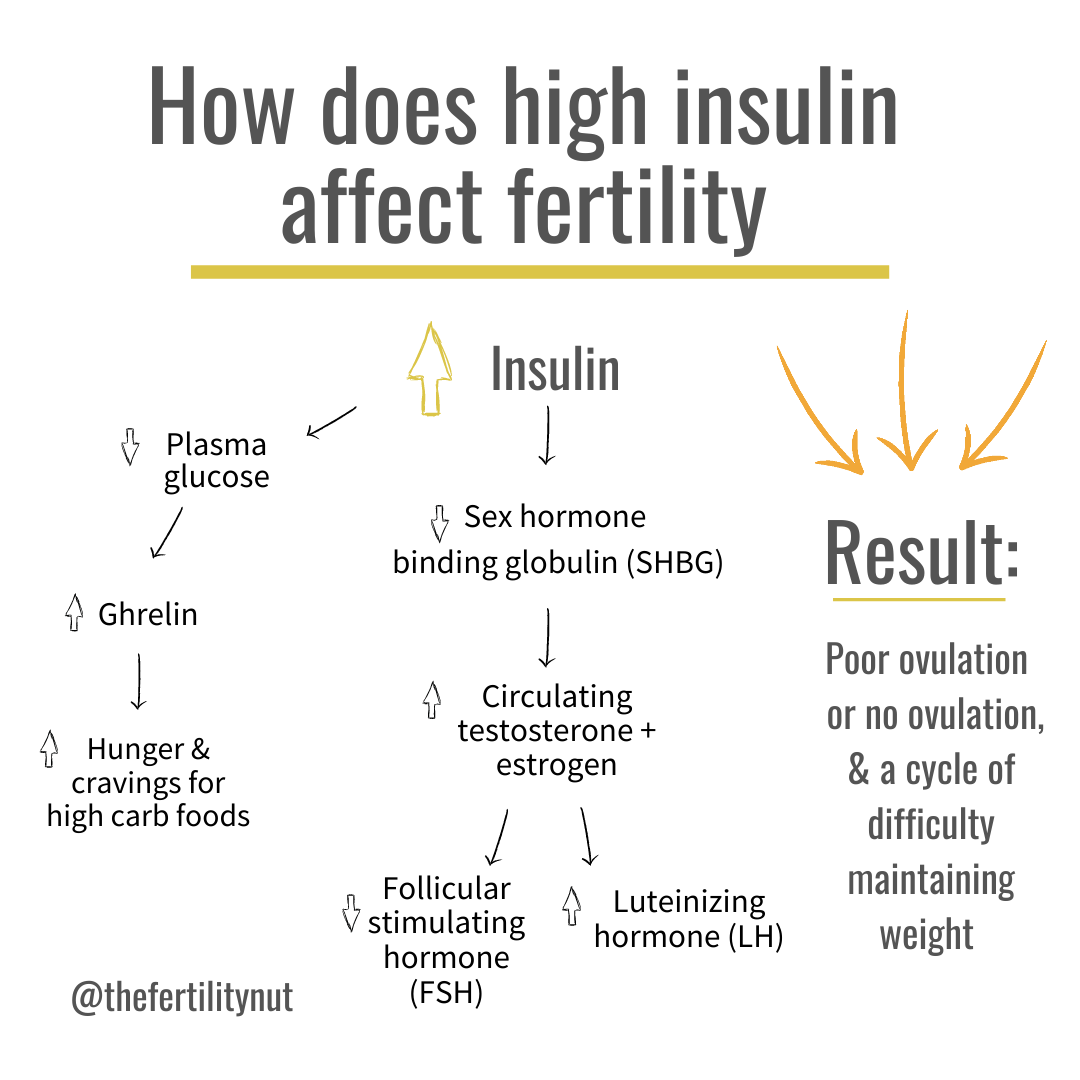Insulin. Probably a term you heard floating around when your uncle was diagnosed with diabetes last fall. Now he’s wearing special socks and injecting himself 3 times a day.
What in the world does insulin have to do with getting pregnant!?!
When most people think about fertility, they’re thinking about sex hormones like estrogen or testosterone. But insulin is a hormone too and it can influence everything from food preferences to ovulation.
Let’s talk about the what, why, and how of insulin and make sure your levels are on point!
What Is Insulin?
Insulin is a hormone made in your pancreas. It goes around absorbing glucose from your blood and it takes the glucose to your cells to use for energy.
I like to picture insulin like a stressed-out waitress running back and forth from your bloodstream to your cells delivering glucose.
But what if your cells aren’t able to absorb the glucose that insulin is bringing to the table?
Poor diet, stress, toxin exposure, and genetics are just a few things that can influence your cells to shut down their insulin receptor sites and create something called insulin resistance.
This sends your pancreas into overdrive making more insulin so that your blood sugars stay stable. There are some big problems with higher levels of this hormone in your system like:
-
Cycling up and down the same 20 pounds
-
Hunger cravings – You’re ready to eat after finishing that bag of chips while binging the newest Netflix original.
-
Irregular menstrual cycles – Did you have your period 30 days ago? 12 days ago? 60 days? You have no idea.
-
Facial hair growth – Razors aren’t just for your legs.
-
Polycystic Ovarian Syndrome

How Does Insulin Affect Fertility?
When you have chronically elevated insulin levels, this reduces your levels of sex hormone binding globulin (SHBG). SHBG is a little nugget that binds up excess estrogen and testosterone to send it out of the body.
If your SHBG levels become low enough, you can end up with elevated sex hormones which affect important ovulation hormones like luteinizing hormone (LH) and follicular stimulating hormone (FSH).
High insulin levels can also send your blood glucose on a rollercoaster ride that increases cravings, mood swings, and weight changes.
All this culminates in a hormone shit storm that affects ovulation and can lead to frustrating weight cycling.
See for yourself in the figure below:

How to Test Your Insulin Levels
This is where things can get a little frustrating.
The routine blood work many physicians order (fasting glucose or Hgb A1C) only measures what your blood sugar is doing, not your insulin. And your pancreas does such a great job at pumping out extra insulin to keep your blood sugars stable that you can have elevated insulin for YEARS before your blood sugar labs are affected.
In fact, once you’re to the point where your blood glucose levels are elevated on lab work, it’s possible that your insulin resistance has worsened into diabetes territory. And we don’t want that.
So what tests can we perform to see if you’re experiencing insulin issues? Here are a few options:
Fasting Insulin Blood Lab
This test measures your insulin levels during a fasted state. Although the “normal” range for fasting insulin goes up to 25 mIU/L, I find that my clients will experience symptoms when their levels are above 7mIU/L.
A fasting insulin blood lab can be done with a simple blood draw at your doctor’s office or lab.
HOMA-IR
The long and complicated name for this one is the Homeostatic Model Assessment of Insulin Resistance. In basic speak, it’s a calculation that compares your fasting insulin and glucose levels.
Here’s the equation:
(glucose in mmol/L) x (insulin in mIU/mL)/22.5.
You want your levels < 1. If you’re > 1, you could be experiencing insulin resistance. This test requires a needle prick with a lancet, but it’s a simple, easy, and effective way to measure insulin resistance.
2-Hour Oral Glucose Tolerance Test
This test requires you to chug a sugary drink and get your glucose and insulin levels tested at 1-hour, and 2-hour intervals.
You’ll have to get needle pricked 3 times during this test (plus the sugar drink doesn’t taste that great). But it’s an effective way to measure your body’s glucose and insulin response after a high carb load.
3 Simple Changes to Improve your Insulin Levels for Fertility
So what to do if your tests confirm that your insulin resistant?!! Here are some simple changes you can make to help balance your blood sugars and reduce your insulin response!
Stop drinking sugary beverages throughout the day
Since sugary drinks digest really quickly they also raise blood sugar levels really and fast.
I recommend reserving high sugar drinks for meal times when you most likely have something more substantial in your meal to slow down digestion. Consider switching to unsweetened tea or water between meals to keep you hydrated without stimulating more insulin release.
Give your body adequate time to digest and rest
Consider giving yourself 3-4 hours between meals and 12-14 hours overnight of no eating to help your body rest and repair itself and bring your hormone levels back down to baseline.
For more info about the timing of your meals, check out my last blog post!
Pair carbs with protein, fat, and fiber to slow down digestion.
Carbohydrates can be a wonderful source of energy but they digest quickly and elevate blood sugars and insulin levels. To slow down the digestive process, try pairing carbs with a protein, fat, and/or fiber source that will help keep you satisfied longer than 20 minutes and balance your blood sugars and insulin response.
For a personalized food + supplement + lifestyle plan to manage insulin and boost fertility, hire a pro! Shoot me a message or get on the waitlist.

+ Show Comments
- Hide Comments
add a comment